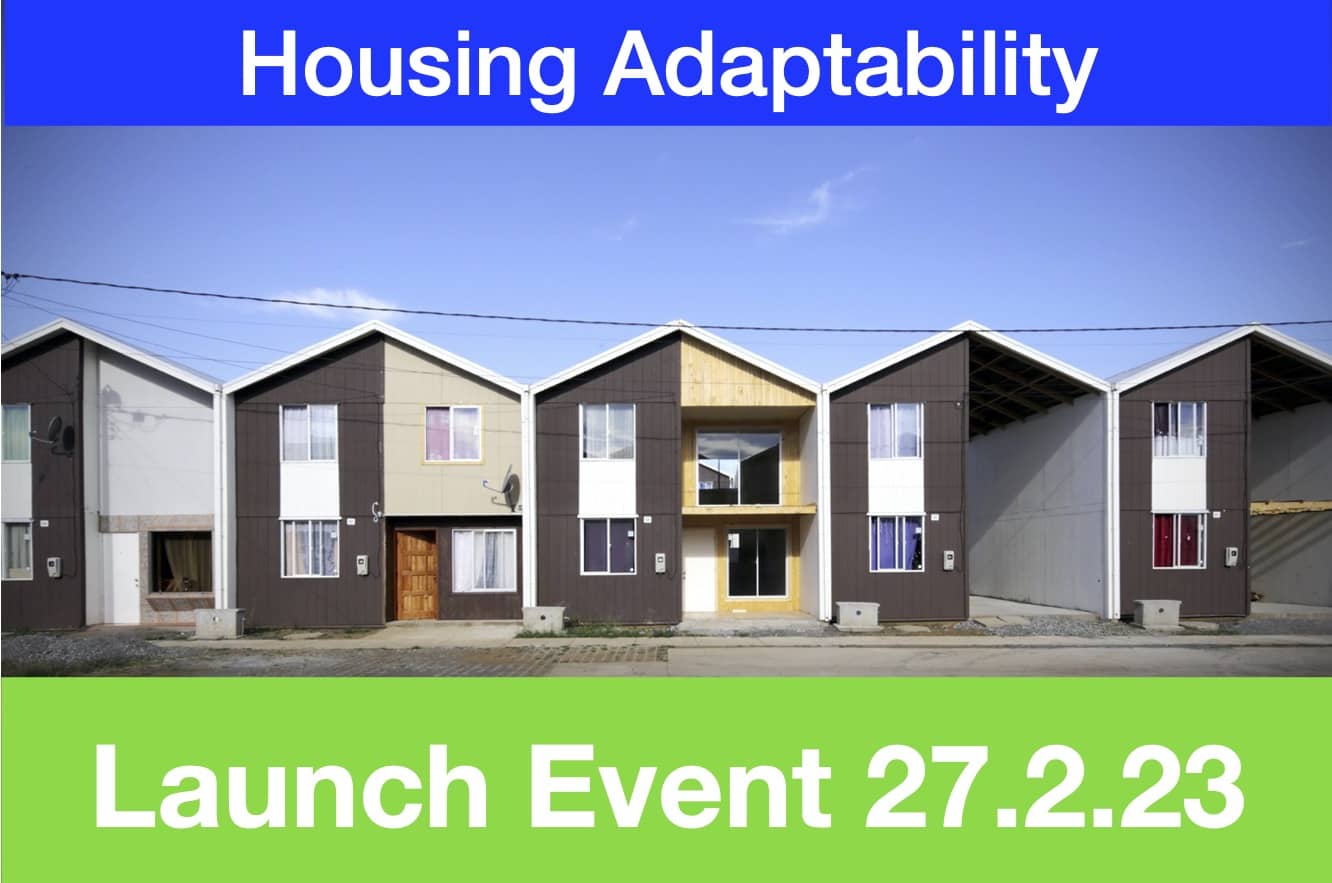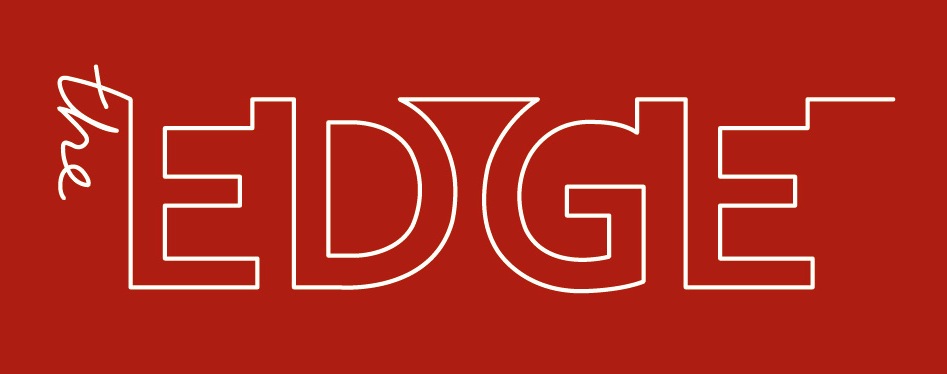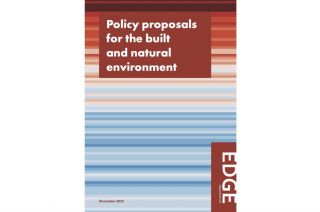
www.buildingsandcities.org/insights/news/housing-adaptability3.html
Housing Adaptability

SPECIAL ISSUE LAUNCH: Join us for a webinar exploring how housing can be made more adaptable
While retrofitting the existing housing stock for climate change mitigation has been well researched, less consideration has been given to the increasingly important issues of the adaptation and flexibility of our homes - especially given the decreasing size of dwellings and changing nature of work and education. What can policymakers, planners, clients, developers and designers do to make new and existing dwellings more adaptable?
To attend, please register in advance:
https://ED136-Housing_adaptability.eventbrite.co.uk
Housing Adaptability: More Than (But Essential To) Climate Issues?
A home's adaptive capacity supports an individual's and community's resilience when faced with inevitable life events and changing demographics (ageing population, migration, fluidity of household structures) and their associated disruptions and consequences.
Based on the recent Buildings & Cities special issue "Housing Adaptablity" guest edited by Sofie Pelsmakers and Elanor Warwick, this event will explore the climatic /environmental, social and economic perspectives for making housing more adaptable. An emphasis on durability will entail buildings that are adaptable to different user needs, but also able to respond to the changing climate to remain fit for purpose. Can a small additional initial investment in adaptability maximise a building's value throughout its life - if so, what is holding us back and what needs to change?

This virtual event is hosted by The Edge in conjuction with Buildings & Cities. It will explore these questions in relation to current practice and new initiatives with contributions from an invited panel and afterwards from the audience.
Participants
| Chair: | John Palmer | UK Department for Levelling Up, Housing & Communities |
| Introduction: | Elanor Warwick | Clarion Housing Group, UK |
| Speakers: | Jyrki Tarpio | Tampere University, Finland |
| Astrid Smitham | Apparata Architects, UK | |
| Marta Smektala | Wroclaw University of Science & Technology, PL | |
| Respondents: | Kirk Archibald | Think Three, UK |
| Amy Burbidge | Homes England, UK | |
| Philip Graham | University of Cambridge, UK | |
| Q&A |
When and where
Online event. Free.
Monday 27 February 2023, 17.00-19.00 GMT/UTC
Advance registration is essential. There are limited places.
Registration: https://ED136-Housing_adaptability.eventbrite.co.uk
Latest Peer-Reviewed Journal Content
Energy sufficiency, space temperature and public policy
J Morley
Living labs: a systematic review of success parameters and outcomes
J M Müller
Towards a universal framework for heat pump monitoring at scale
J Crawley, L Domoney, A O’Donovan, J Wingfield, C Dinu, O Kinnane, P O’Sullivan
Living knowledge labs: creating community and inclusive nature-based solutions
J L Fernández-Pacheco Sáez, I Rasskin-Gutman, N Martín-Bermúdez, A Pérez-Del-Campo
A living lab approach to co-designing climate adaptation strategies
M K Barati & S Bankaru-Swamy
Mediation roles and ecologies within resilience-focused urban living labs
N Antaki, D Petrescu, M Schalk, E Brandao, D Calciu & V Marin
Negotiating expertise in Nepal’s post-earthquake disaster reconstruction
K Rankin, M Suji, B Pandey, J Baniya, D V Hirslund, B Limbu, N Rawal & S Shneiderman
Designing for pro-environmental behaviour change: the aspiration–reality gap
J Simpson & J Uttley
Lifetimes of demolished buildings in US and European cities
J Berglund-Brown, I Dobie, J Hewitt, C De Wolf & J Ochsendorf
Expanding the framework of urban living labs using grassroots methods
T Ahmed, I Delsante & L Migliavacca
Youth engagement in urban living labs: tools, methods and pedagogies
N Charalambous, C Panayi, C Mady, T Augustinčić & D Berc
Co-creating urban transformation: a stakeholder analysis for Germany’s heat transition
P Heger, C Bieber, M Hendawy & A Shooshtari
Placemaking living lab: creating resilient social and spatial infrastructures
M Dodd, N Madabhushi & R Lees
Church pipe organs: historical tuning records as indoor environmental evidence
B Bingley, A Knight & Y Xing
A framework for 1.5°C-aligned GHG budgets in architecture
G Betti, I Spaar, D Bachmann, A Jerosch-Herold, E Kühner, R Yang, K Avhad & S Sinning
Net zero retrofit of the building stock [editorial]
D Godoy-Shimizu & P Steadman
Co-learning in living labs: nurturing civic agency and resilience
A Belfield
The importance of multi-roles and code-switching in living labs
H Noller & A Tarik
Researchers’ shifting roles in living labs for knowledge co-production
C-C Dobre & G Faldi
Increasing civic resilience in urban living labs: city authorities’ roles
E Alatalo, M Laine & M Kyrönviita
Co-curation as civic practice in community engagement
Z Li, M Sunikka-Blank, R Purohit & F Samuel
Preserving buildings: emission reductions from circular economy strategies in Austria
N Alaux, V Kulmer, J Vogel & A Passer
Urban living labs: relationality between institutions and local circularity
P Palo, M Adelfio, J Lundin & E Brandão
Living labs: epistemic modelling, temporariness and land value
J Clossick, T Khonsari & U Steven
Co-creating interventions to prevent mosquito-borne disease transmission in hospitals
O Sloan Wood, E Lupenza, D M Agnello, J B Knudsen, M Msellem, K L Schiøler & F Saleh
Circularity at the neighbourhood scale: co-creative living lab lessons
J Honsa, A Versele, T Van de Kerckhove & C Piccardo
Positive energy districts and energy communities: how living labs create value
E Malakhatka, O Shafqat, A Sandoff & L Thuvander
Built environment governance and professionalism: the end of laissez-faire (again)
S Foxell
Co-creating justice in housing energy transitions through energy living labs
D Ricci, C Leiwakabessy, S van Wieringen, P de Koning & T Konstantinou
HVAC characterisation of existing Canadian buildings for decarbonisation retrofit identification
J Adebisi & J J McArthur
Simulation and the building performance gap [editorial]
M Donn
Developing criteria for effective building-sector commitments in nationally determined contributions
P Graham, K McFarlane & M Taheri
Join Our Community

The most important part of any journal is our people – readers, authors, reviewers, editorial board members and editors. You are cordially invited to join our community by joining our mailing list. We send out occasional emails about the journal – calls for papers, special issues, events and more.
We will not share your email with third parties. Read more



Latest Commentaries
COP30 Report
Matti Kuittinen (Aalto University) reflects on his experience of attending the 2025 UN Conference of the Parties in Belém, Brazil. The roadmaps and commitments failed to deliver the objectives of the 2025 Paris Agreement. However, 2 countries - Japan and Senegal - announced they are creating roadmaps to decarbonise their buildings. An international group of government ministers put housing on the agenda - specifying the need for reduced carbon and energy use along with affordability, quality and climate resilience.
Building-Related Research: New Context, New Challenges
Raymond J. Cole (University of British Columbia) reflects on the key challenges raised in the 34 commissioned essays for Buildings & Cities 5th anniversary. Not only are key research issues identified, but the consequences of changing contexts for conducting research and tailoring its influence on society are highlighted as key areas of action.